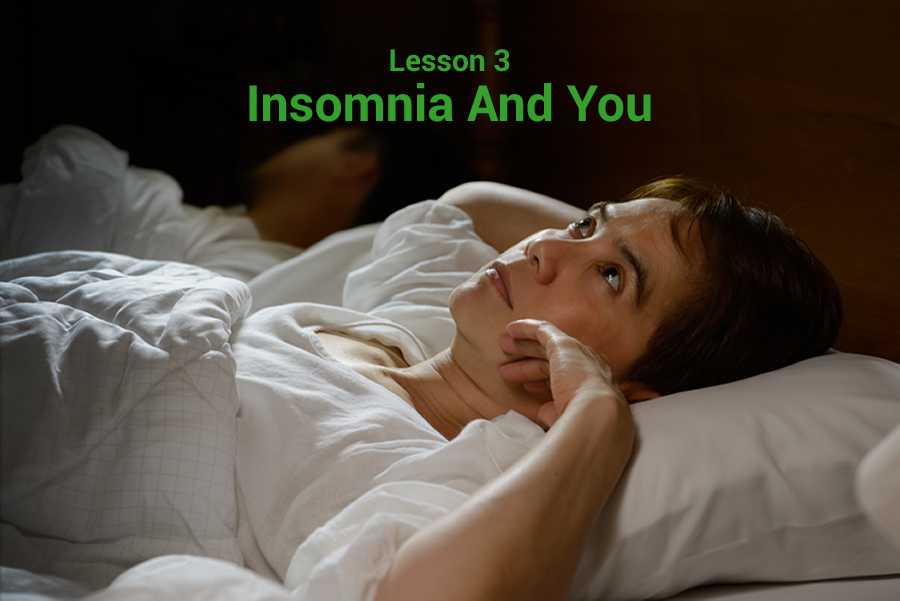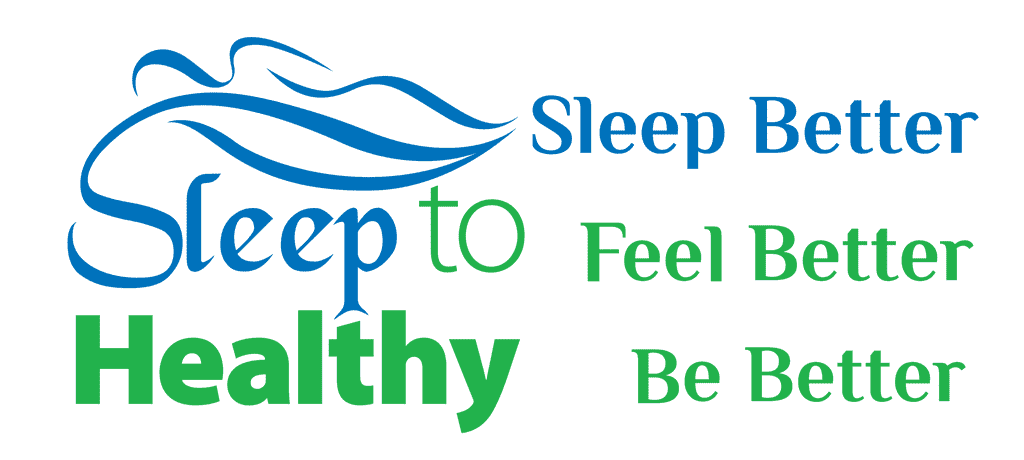
Lesson 3
Insomnia and Your Health
(You have access to two formats, feel free to use either one.)
Listen
Lesson 3: Insomnia and You
Watch
Lesson Summary Insomnia and Your Health:
- Definition of chronic insomnia: 3 or more nights per week of poor sleep with significant related daytime complaints for 3 months or more. You might define yours differently. There are short term effects of insomnia.
- Short term insomnia is normal.
- How you developed insomnia: 1 – Predisposed to having sleep disturbed in your environment. 2 – Event that disturbs your sleep. 3 – Continued bad habits and detrimental thoughts and beliefs about sleep. These causes of insomnia disorder may continue long after the original cause is long gone. Will learn how to cure insomnia with CBT for insomnia and how insomnia affects our health
- Causes of insomnia: Psychological (stress, mental disorders, detrimental beliefs), Body (Sleep apnea, medical conditions, pain, alergies, aging), Chemicals (Medications, excess caffeine, nicotine, alcohol, drugs, hormone shifts), environmental (shift work, noise, heat, cold, TV, uncomfortable bed) and unknown causes. All are causes of insomnia disorder.
- If you or your partner snore, it might be a serious but curable medical condition called sleep apnea and should be checked out.
- Your job is to control your causes of insomnia listed above the best you can. Mine is to teach you how to sleep the best you can given your situation.
- Measures of sleepiness with sleep tests. Epworth sleepiness Scale and Stanford Sleepiness Scale (see links).
- Sleepiness and Tired are two different things.
- The media greatly exagerates insomnia and your health and how insomnia affects our health. There are no proven health risks to insomnia. It just makes you feel substandard & sleepy, you will be on edge emotionally and you will have to work harder to focus and perform well mentally. So don’t stress about your insomnia too much.
- If you want to improve your overall health and longevity, probably the best thing you can do is excercise.
- CBTi or CBT for Insomnia or Cognitive Behavioral Therapy for Insomnia is a drug free method but can be used while taking sleep medications or other remedies.
Assignment:
- Go through the list of causes of insomnia and see if any might apply to you.
- Brainstorm to find ways to mitigate them to the degree possible given your situation. A visit to your family doctor or health professional migth be in order to uncover causes of insomnia disorder.
- Look through your sleep journal and diary to see if you can spot any potential causes of your insomnia and short term effects of insomnia.

Podcast Transcript
Hello, welcome to the Sleep…. to Healthy Podcast. I’m your instructor Dennis Trumpy, and this is lesson #3 of the sleep to healthy, how to cure insomnia, class. This lesson is titled “Insomnia and You”. In the last lesson we learned about sleep. This lesson we will focus on insomnia, how you developed your insomnia and some initial steps you can take to help with your sleep and make the method used in this course more effective.
Read More How Insomnia Affects Our Health ...
Now that I’ve covered the science of sleep, I can turn to insomnia. When discussing insomnia with your doctor, it’s helpful to know the technical definition of insomnia because you might be shocked at the gap between your definition of insomnia and your doctor’s.
Insomnia defined: Clinically, Insomnia is defined as 3 or more nights of poor sleep for 3 months or longer along with a significant impact on daily performance such as excessive sleepiness, irritability or the inability to function well at work. I’ll repeat that. 3 months of 3 or more nights per week along with a related daytime complaint. Most people would judge this to be a pretty extreme definition of insomnia. In the course, I’m not going to stick too closely with the official definition. For me, if you’re dissatisfied with your sleep, then you have insomnia and you will benefit by joining me in this course.
But that being said, it can be counterproductive to over-focus on your insomnia. Sleeping poorly can be a normal response to life’s stressors. If you have an important deadline coming up and you find yourself having trouble sleeping, this is likely perfectly normal and not insomnia. If you have been struggling with important relationships in your life and it seems to be interfering with your sleep, then you can relax knowing that your sleep will likely return to normal when these tensions resolve themselves and you probably don’t have chronic insomnia.
Still, single events can trigger long term insomnia as you may develop counterproductive habits or thoughts or lose your confidence to sleep well. CBTi should help you get back on the right track and mitigate short term effects of insomnia.
Technically, there are 2 types of insomnia. The 1st is having trouble getting to sleep. The 2nd is having trouble staying asleep such as waking up and not being able to get back to sleep or waking up too early.
3 P model modified:
Many things can cause insomnia, some controllable, some not so easy to control. You may be wondering how you ever developed insomnia in the 1st place. Let’s talk about the predisposition, cause and continue model of developing insomnia:
The 1st factor is predisposition. Your brain might be genetically predisposed to light sleeping where nighttime disturbances more easily disturb you sleep. You might be a highly sensitive person who responds to disturbing life events with stress or anxiety. We all have different sensitivities to taste, smell, touch and emotions and sleep is no different. You might be predisposed to having your sleep more easily disturbed.
The 2nd factor is cause. These are events that happen that disturb your sleep. It can cause short term effects of insomnia. It could be having a child, or a traumatic event, or a medical condition, or the loss of someone you love or any of the other causes of insomnia I will list in a minute.
It is your job, outside of this course, to manage these causal factors as best you can. The purpose of this course is to help you sleep the best you can given your life’s situations. But it is your job to take care of any insomnia causing conditions as best as you are able.
An interesting thing happens at the cause step. When something happens that disrupts your sleep, it can trigger a new cause of insomnia and causes of insomnia disorder. For example, your original cause of losing sleep might be job stresses. Not sleeping well when job stresses are high is perfectly normal. But you likely responded to the original cause of sleeplessness with behaviors and beliefs that cause insomnia in and by themselves. For instance, you might have started extending your time in bed to cope with your sleepless nights. But as we will learn, this is a terrible coping skill when it comes to curing insomnia.
Even after the original job stress is relieved, you have carried forward this bad habit of long times in bed which causes your insomnia to continue. This is the continue part of the predisposition, cause and continue model of insomnia. harmful
This course will deal with your behaviors, beliefs and emotions that cause your insomnia to continue.
Michael Schwartz put- it this way: <Audio> and Dr. Daniel Erichsen had this to say: <audio> about CBT for insomnia.
That is the great irony of insomnia. The harder we try to fight it, the more the insomnia monster grows. It is like cutting the leg off a starfish. Instead of harming the starfish, it grows a new one and in addition the leg cut off can grow into a new starfish. In this course we are going learn how to work with your natural sleep systems to cause your sleep starfish to disappear.
Causes of Insomnia: <~10:00> Let’s look at the causes of insomnia. Remember, it is your job to identify your causes of insomnia and deal with them as effectively as you can. Listen to the list carefully and see if any of these apply to you:
Causes fall into 5 categories: Phycological, body, chemicals, environmental and unknown.
– The 1st category is Psychological factors:
– Life stressors such as work or relationship or financial issues
– Psychological issues such as depression, bipolar disorder, psychotic disorders and anxiety disorders
– Unhealthy or incorrect understanding of sleep and the resulting erroneous actions. This is what we will be tackling in this course.
– The 2nd category is Human body factors:
– Sleep apnea, where you frequently stop breathing during your sleep. By the way, if you feel very tired during the day but think you sleep well, you might have sleep apnea and should seek medical advice as this can be a very serious sleep disorder.
– Medical conditions such as heart disease, Heartburn, Chronic pain such as arthritis, Neurological conditions such as Parkinsons, or hyperthyroidism . *** May be undiagnosed medical condition *** so always see a health care professional for diagnosis and advice.
– Allergies, especially nasal allergies
– Aging and its effects
– Restless leg syndrome
– The 3rd category is Chemical factors:
– Medications
– Excess caffeine or nicotine
– Use of alcohol or drugs
– Long term use of some sleeping pills
– Hormone shifts and menopause
– The 4th category is Environmental factors:
– Shift work
– Environmental noise or disruptions during sleep such as street noise, a snoring partner or having young children
– And finally the 5th category is Unknown causes: Sometimes we are not able to identify what causes your insomnia. Hopefully as medical science advances, all causes will some day be discovered.
This is not a complete list, so check out any other potential factors with your health care professional. An important message is that although you may suffer from some or any of these causes, you can learn to sleep better. You may know of someone with a condition that would cause you to have insomnia, such as drinking coffee in the evening, but they seem to still manage to sleep well, or at least much better that you would. This tells you that at least part of the insomnia is controllable and can be improved.
Michael Schwartz gives some advice if the cause of your insomnia is medical: <Audio> and how insomnia affects our health.
Again, it is important that you tackle any issues that may be causing your insomnia to the degree that you are able.
My own life serves as an example of how the cause can be different from the continuing factor. I’m in my 60s and semi-retired. The issues that started my insomnia – young children waking through the night, career worries and financial anxiety – are all distant memories. But the insomnia continued. It wasn’t until I focused on CBTi used in this course that my sleep issues were resolved and I was able to improve my sleep.
It’s up to you to deal with any underlying cause of insomnia the best you can. The focus of my course is to give you the tools to get the best sleep you can given the constraints of your life. If the underlying problem is medical or psychological, then you should seek help from a qualified professional. Be sure to let them know what you’re doing to improve your sleep such as CBT for insomnia so you can work as a team. And that insomnia and your health is there concern. They will know how insomnia affects our health.
Measure sleepiness: If you’re wondering whether your level of sleepiness is excessive or normal, you can take the Epworth sleepiness scale test. It asks you your likelihood of falling asleep under different situations such as laying down on a couch in the afternoon or watching TV, or being a passenger in a car or stopping at the stoplight while driving. A link to online tests is on my website, sleeptohealhy.com. If you want an accurate assessment of your sleepiness, you should consult an appropriate sleep specialist. As mentioned earlier I cannot emphasize enough the importance of judging your sleep based on your experience, not trying to fit into a national average. So trying a test or two can be helpful. It also gives you a baseline that you can compare every few weeks to measure your progress as you complete this course.
An easier sleepiness test is the Stanford Sleepiness Scale. It is considerably simpler and measures your level of sleepiness at a specific point in time during the day, not throughout the day. A score below 4 indicates that excess sleepiness may be an issue. If you use this test, avoid evaluating yourself in the mid afternoon when most of us experience a natural mid-afternoon slump and feeling of sleepiness.
Remember that feeling sleepy and having trouble focusing during the afternoon dip, around 2 pm, might be normal and not to be concerned about.
Be careful not to confuse tiredness with sleepiness as we often use the 2 terms interchangeably. Tired means that you are physically exhausted from excess exertion, such as after you have been on your feet all day working. Or tired could mean that you are kind of bored with life or that life isn’t going as you like it so you feel despondent. Or you could be mentally exhausted from working on a complex task for a long time. It is only when you show signs of falling or wanting to fall asleep that you are sleepy. They are two independent systems. That is why you might be tired from a long, hard day of work but still be unable to fall asleep.
Some signs that you may be sleep deprived include:
– It takes you a lot of will power to get up, need the snooze button or multiple alarms.
– You sometimes miss appointments or are late to work because of getting up late.
– It is difficult for you to socialize in the morning.
– You are sleepy during the day, showing physical signs like excessive yawning, dropping of the head, slow blinking or a blank staring.
– You fall asleep before going to bed such as sitting on the sofa watching TV. The earlier the nodding off, the worse the sleep deprivation.
– You fall asleep as soon as your head hits the pillow, especially if you dream right away.
– You need lots of naps during the day. A single, properly timed nap is fine. This will be covered in a later lesson.
– You sleep in on weekends,
– You are irritable or depressed,
– You need caffeine or energy drinks to stay awake & you feel sleepy if you try to cut back.
– You can’t concentrate or remember things, missing appointments, forgetting conversations.
– You make mistakes because your thinking is foggy, you become clumsy, it is hard to concentrate, and you feel rushed and unable to cope.
– You are losing interest in life including things you used to find enjoyable.
It is also important to know when CBTi may not work and CBT for insomnia. Again, Mr. Schwartz: <Audio>
In many cases, curing your insomnia will mean changes in lifestyle and sleep style, so don’t be hesitant to seek help as change, even for the better, can be a difficult journey. It’s usually best not to do it alone. Sleep coaches and specialists, either in person or on-line are available to help you succeed.
Insomnia and health risks: There is a lot of hype in the media about the horrible impact insomnia can have on your health. But as Dr. Erichsen explains, this is more myth than fact. <Audio>
We have to be careful to understand what Dr. Erichsen said. He is not saying that there are no long term health effects from having insomnia, but that there are no known long term health implications. Currently you just don’t know, so don’t worry unnecessarily about health risks that likely don’t exist. You already have good reason to tackle your insomnia – You feel like mediocre, you are impatient, and you don’t function well. Those are good enough reasons to tackle your insomnia. You don’t need a bunch of unproven health issues heaped on top of that. To avoid feeling rotten, irritated and incompetent are good enough reasons, don’t you think?
I would like to mention another good reason to tackle your insomnia. Your insomnia likely effects not only you but the people you interact with every day. Insomnia can impact your mood, your judgement and your decisions. You may find yourself easily irritated and impatient. You may notice that you tend to view other people and life in general more negatively compared to when you sleep well. And you may find it hard to work through complex decisions, and all decisions involving other people are complex. By tackling your insomnia, you are improving the lives the people you love and work with. You will be making the world a better place. As you work through this course and find yourself getting bogged down or wanting to give up, persevere for others, even if you can’t find the motivation to do it for yourself.
A few more general comments about this course:
Cure insomnia perpetuators: This course can help you with your insomnia pretty much regardless of your situation. However, CBTi or Cognitive Behavioral Therapy for Insomnia that this course is based on, will be most successful if your condition or situation causing the insomnia is dealt with first. For instance, if you have sleep apnea, get that dealt with, otherwise CBTi will have limited impact on you. So I encourage you to talk to your health care provider about your insomnia to fully explore correcting any underlying conditions, including ones that have not been mentioned here. Also, there are situational factors, such as a snoring partner, you should try to correct this to the degree it is practical. Some of these will be dealt with in the lesson on sleep tips.
Drug Free: The methods in this course are drug free. The methods can be used in conjunction with nearly all sleep aids, whether medical or herbal or routines or psychological. But you are ultimately responsible for deciding if your sleep crutch is a good fit for you as I don’t know anything about your specific situation. That said, the method encourages you to prudently wean yourself off any sleep aids you may use as you gain mastery in your newfound sleep skills. Stopping medicines will require advice from your health care provider as many medicines have adverse effects if they are discontinued incorrectly. A core belief of CBTi is that you can sleep well with minimal external sleep crutches. More will be said about this in a future lesson.
And to be clear, when I talk about drug free, I am not talking about doing away with medicines or techniques or devices that are dealing with an insomnia causing issue such as pain or sleep apnea.
Exercise: One more point. You may be taking this course because you want to have a better and longer life. Focusing on your sleep is great, but from my research, the most potent single thing you can do to improve your life is to have a good exercise program. Getting regular exercise will not only help with your sleep, but also your longevity, physical health, mental health, cognition, mood, relationships and self esteem. So you have nothing to lose. It really is an elixir for a better life. But as always, check with your health provide first. So you are not already exercising, then I would start that first or at the same time as taking this course.
Conclusion:
Now you have a basic understanding of insomnia. We have covered a lot of information. It’ll be helpful to review this lesson after you have listened to the other lessons as it will make a lot more sense then and you will likely notice information that didn’t seem important at the time and you forgot. Also, I might have made some improvements since this recording.
Show notes are available at: sleeptohealthy.com.
The next lesson is titled “The Strange World of CBTi” <in strange voice?>. We will learn about the 5 elements of CBTi – Compact sleep, Sleep Buddy, Sleep Myths, Relaxation techniques and Sleep Tips. Some of the methods are quite counterintuitive and would appear strange to someone who doesn’t understand sleep and insomnia as you do.
Michael: <Audio from next lesson>
Assignment:
This lesson, like the other lessons, comes with an assignment. You can find the assignments at sleeptohealthy.com. In fact, sign up for our email newsletter on sleeptohealthy.com and receive the assignments as soon as the lesson is released. Knowing the assignment ahead of time helps you to focus on what’s important during the lesson.
Today’s assignment is go through the list of insomnia causes and see if any apply to you. I have posted the list on sleeptohealthy.com or you can re-listen to that part of this episode which is around the 10 minute mark.
Then brainstorm to see if you can find ways of mitigating the cause of your insomnia. Maybe it means you stop procrastinating and finally make that trip to the family doctor. Or perhaps its time you talked to your snoring partner about how it disrupts your sleep. Important: If you or your partner have a snoring issue, it could be a warning sign that you or they suffer from obstructive sleep apnea, a serious medical condition that needs to be looked at.
The sleep journal that you started in Lesson #1 can help identify the cause and effect relationship of what is the root your insomnia.
If you can make some progress on tackling the source of your insomnia, then you will stand a much better chance of reaping the full benefits of this course.
Disclosure:
This podcast is not a substitute for advice from a qualified healthcare professional. The sole purpose of this podcast is to educate and entertain. As we do not know your particulars, we cannot and do not provide professional or medical advice or services. We strongly encourage you to consult a healthcare professional before incorporating any ideas in this podcast. Listeners who use the information in this podcast do so at their own risk.
Outro:
You don’t need tons of sleep trivia and people’s opinions about sleep. You just need to know proven instructions on what you can do today, to sleep better tonight, so you can feel and function better tomorrow. This allows you to repeat lessons as it’s hard to absorb all the knowledge the first time through, and the information will make more sense after you have the context of the whole course.
You, like most people, will likely benefit from repeated listening. The lessons will be updated based on student feedback. So the next time you listen to the same lesson, it may be improved since last time. And that’s about it. Thanks for joining my in my sleep class.
I look forward to seeing you again on the next episode of the sleep to healthy podcast. See you then.

